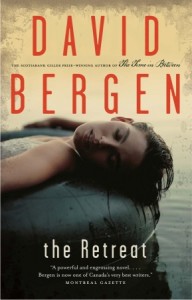 This may be hyperbole, but I think David Bergen is a national treasure. It’s quite a statement to say that over the course of reading four of his novels, his Giller winner (The Time in Between) remains my least favourite. People, it won a major prize! Overall, I devoured A Year of Lesser and See the Child, and thought they were both excellent. But The Retreatmight just be my favourite Bergen novel so far — but I haven’t read The Matter with Morris(just the first 50-odd pages for work), so I am reserving judgment until then.
This may be hyperbole, but I think David Bergen is a national treasure. It’s quite a statement to say that over the course of reading four of his novels, his Giller winner (The Time in Between) remains my least favourite. People, it won a major prize! Overall, I devoured A Year of Lesser and See the Child, and thought they were both excellent. But The Retreatmight just be my favourite Bergen novel so far — but I haven’t read The Matter with Morris(just the first 50-odd pages for work), so I am reserving judgment until then.
The majority of the action in The Retreat takes place at a camp, the retreat of the novel’s title, near The Lake of the Woods, just outside of Kenora. The landscape, having spent about a week there at a cottage of an old ex-boyfriend way back in the way back, is beautiful. The Lake of the Woods itself is huge, with crisp blue waters, but the pond close to the property isn’t. It’s murky, filled with reeds, and just as dangerous — it’s an important distinction, because major accidents and/or incidents happen throughout the book on or close to the water, and Bergen’s ability to weave such an archetypal theme (man vs. nature) within his more specific, personal story, remains one of the book’s true accomplishments.
But let me digress. Raymond Seymour, an 18-year-old Ojibway boy, finds himself embroiled in an love affair with niece of the local police. Their relationship — hot and heavy — burns out quickly, and not just as a result of the intervention of her father and uncle but, because, it’s just not meant to last. Alice’s uncle takes Raymond out onto the Lake and dumps him on an island — expecting him not to return. This dynamic, bad cop/good kid, feels familiar, and it should, the relationship goes exactly where you expect and the penultimate action remains utterly heartbreaking. It’s 1974, and Bergen chooses as a secondary background of sorts, to wrap The Kenora Crisisaround his story, even though Raymond and his brother, who has just returned from being “raised” (read: forcibly removed) by a Mennonite family in the south, are tangentially involved in the uprising.
When Lizzie Byrd (17) and her family arrive at The Retreat, a quasi-commune run by “the Doctor,” a self-important, psycho-babbling fool who cons people into believing he can heal their souls by “talk” and the simple life of camp, she’s reluctant to participate. The births of her younger siblings have been hard on her mother, and her father desperately tries to save his family and her sanity by granting her every wish — in this case, it’s to spend the summer at The Retreat. Lizzie meets Raymond and a cautious friendship evolves into something more substantial. As the summer progresses, their feelings grow deeper, regardless of whether they truly understand one another’s complex situations (her crazy family; his unfortunate situation with the cop that never seems to end). But as the season comes to an end, the novel finds its conclusion — the characters, distraught, damaged and utterly changed by the events of the summer. It’s an amazingly quiet novel for the amount of emotional damage that is wrought on the people within, which remains Bergen’s exceptional ability as a writer — to place people in crisis and not let them entirely recover.
This is my favourite kind of book, a great setting, a complex, real issue that meant something in history, family dynamics that remain complex and difficult, and action that’s both believable and well-paced. In short, it’s an excellent read, probably one of the best books off my shelf. The Bs have been utterly kind to me (Barnes, Bergen, brilliant!).